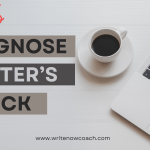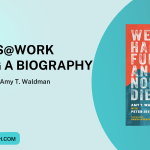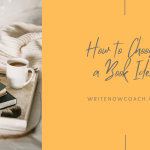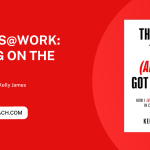Writers@Work: Writing Novels in Verse
April 4, 2023
Note From Rochelle
Dear Writers,
Are you procrastinating signing up for this April’s class on Overcoming Procrastination? We meet April 17 and 24—and I’d love to have you there!
So many of the people I work with beat up on themselves for being lazy or not having enough discipline to do their work. But the truth is, we procrastinate because we’re anxious, frustrated, or filled with self-doubt. In order to overcome procrastination, we need to deal with our emotions.
At Overcoming Procrastination, you’ll learn what type of procrastinator you are, what tools work best for you, and how to use tapping to help you work through your emotional blocks. I’m teaching the class with Liesel Teversham, an expert in EFT Therapy.
Don’t let this opportunity to help yourself pass you by. Here’s the link to sign up: https://writenowcoach.com/workshops/workshop-overcome-procrastination-and-write/
For today’s tip, I’m celebrating National Poetry month by interviewing Padma Venkatraman, the author of several novels in verse. In our interview, she offered a tip for using poetry in your writing and suggested some great reads for National Poetry Month.
Happy writing,
Rochelle, the Write Now! Coach
Writers@Work: Writing Novels in Verse
An Interview with Padma Venkatraman
Can you talk about your writing and especially your most recent book Born Behind Bars.
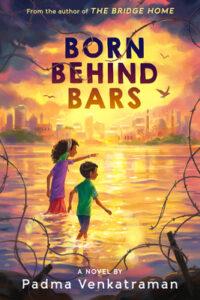 Born Behind Bars was inspired by an article I came across about a woman who was destitute in India and was jailed for longer than if she had been convicted and sent to prison. When I heard that she had a son and thought about children who are born in India and jail, and even in the United States behind bars, I began to think and wonder about what that experience would be like. I saw a boy (a character) sitting in a dirty, dingy jail cell, and realized he was singing, and his voice was literally reaching out of those bars and up to the stars. And I thought about all of the things that one cannot lock up like creativity and compassion and courage.
Born Behind Bars was inspired by an article I came across about a woman who was destitute in India and was jailed for longer than if she had been convicted and sent to prison. When I heard that she had a son and thought about children who are born in India and jail, and even in the United States behind bars, I began to think and wonder about what that experience would be like. I saw a boy (a character) sitting in a dirty, dingy jail cell, and realized he was singing, and his voice was literally reaching out of those bars and up to the stars. And I thought about all of the things that one cannot lock up like creativity and compassion and courage.
I was delighted to read that you are an oceanographer! How did you work as a scientist prepare you for a career in writing?
As a scientist one learns the value of asking important questions. Questions often help me hone my novels. For example, my debut, Climbing the Stairs, came about when I asked myself where I stood on the issue of non-violence and whether I thought violence was ever justifiable.
It’s National Poetry Month! You have written at least one novel in verse and have several poems in books and journals. Can you talk about how writing a novel in verse helped you tell the story in a way that prose couldn’t?
Reading and writing poetry helps me intensify emotion in my novel. A novel in verse, to me, is like polished gems strung to make a brilliant necklace in which each poem captures an emotionally important and relevant moment.
Can you share a poetry writing exercise for writers who are not poets but might want to STRETCH their poetry muscles?
Poetry is, among other things, about the movement or tension between what’s within versus what’s outside us. A simple exercise is to just gaze out a window, make notes on what you perceive, and then consider how your mental state might change your view. Born Behind Bars captures so much on the first page, in which all the protagonist does is look out the tiny window of a jail cell, but you immediately understand what he yearns for above all else.
Can you share your three favorite poetry or poetry-writing books?
No! I can’t! Because I love poetry and I can’t stop at 3. When I finish this list, I am sure I’ll remember more poets I love. But here are a few:
For poetry as a picture book: anything and everything by Jacqueline Woodson, Margarita Engle, and Aida Salazar
For verse novels: Garvey In The Dark, The Poet X, Long Way Down, Crossover, Other Words For Home, Orchards
For anthologies of poetry: I Sing the Body edited by Rene Saldana Jr., Rhyme & Rhythm edited by Sarah J Donovan, Things We Do edited by Janet Wong and Sylvia Vardell
Poetry collections : Marilyn Nelson, Naomi Shihab Nye, Rita Dove
Poets I respect whose encouragement has been vital to me: Richard Blanco, Greg Pardlo, Peter Covino, Scott Hightower, Peter Johnson, Laura Shovan and I will end by repeating a name I began with: Margarita Engle.
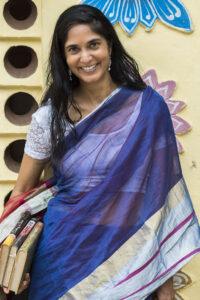 About the author. Padma Venkatraman is the author of BORN BEHIND BARS, THE BRIDGE HOME, A TIME TO DANCE, ISLAND’S END and CLIMBING THE STAIRS. She is the winner of a WNDB Walter Dean Myers Award, Golden Kite Award, Crystal Kite Award, two Nerdy Book Awards, two Paterson Prizes, two Julia Ward Howe awards, three South Asia Book Awards and many other awards and honors. Her novels have been shortlisted for over 20 state awards, received over 20 starred reviews, appeared on numerous best book lists, such as the ALA Notable, NYPL Best Book, Kirkus Best Book, Booklist editor’s Choice and Junior Library Guild selection. Her poetry has been published in Poetry magazine and elsewhere.
About the author. Padma Venkatraman is the author of BORN BEHIND BARS, THE BRIDGE HOME, A TIME TO DANCE, ISLAND’S END and CLIMBING THE STAIRS. She is the winner of a WNDB Walter Dean Myers Award, Golden Kite Award, Crystal Kite Award, two Nerdy Book Awards, two Paterson Prizes, two Julia Ward Howe awards, three South Asia Book Awards and many other awards and honors. Her novels have been shortlisted for over 20 state awards, received over 20 starred reviews, appeared on numerous best book lists, such as the ALA Notable, NYPL Best Book, Kirkus Best Book, Booklist editor’s Choice and Junior Library Guild selection. Her poetry has been published in Poetry magazine and elsewhere.
Before becoming an American author, Dr. Venkatraman spent time under the ocean and in rainforests, served as chief scientist on oceanographic research vessels where she was the only BIPOC female, and also worked as a teacher and diversity director. When she’s not writing, she loves speaking to others about her love for books and her passion for diversity, equity and inclusion and has presented keynote addresses, conducted writing workshops and attended festivals and conferences around the world. She is the founder of www.diverseverse.com and www.authorstakeaction.com. Visit her at www.padmavenkatraman.com to explore resources and sign up for her newsletter to receive writing prompts and more; arrange for a visit via https://theauthorvillage.com/presenters/padma-venkatraman/; follow her on twitter (@padmatv); (@venkatraman.padma) on fb and ig.




